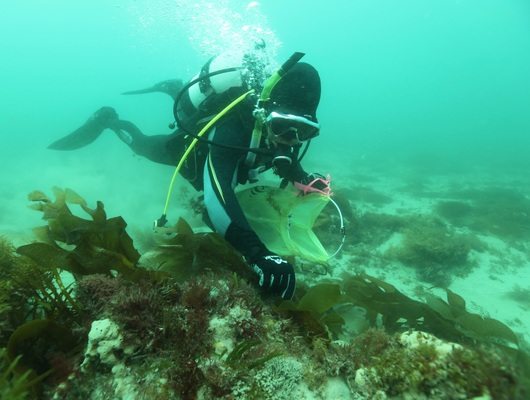Authorities hope they have contained a noxious marine pest to Apollo Bay’s harbour after battling it at one of the region’s premier dive sites late last year.
Parks Victoria investigators reported “no visible spread” of the Japanese kelp, undaria, after receiving unconfirmed reports of outbreaks at two sites outside the harbour.
Authorities have been battling to contain the pest at Apollo Bay since 2009, with Port Phillip Bay the only other outbreak site in Victoria.
Last year divers launched eight missions to clear the weed from Pope’s Eye, an iconic recreational dive site off Queenscliff.
The Indy reported in December that the discovery of undaria in southern Port Phillip Bay raised fears the kelp could be about to spread offshore but authorities were confident it remained inside the heads.
The marine pest outgrows native seaweed, taking over territory and damaging the habitat of marine animals and other indigenous plants.
Parks Victoria said the latest inspections at Apollo Bay gave “hope that control efforts, education and the natural health of the marine environment are containing the marine pest”.
The department initially feared that the kelp had invaded a nearby marine sanctuary.
“We’re pleased to report that diving at Marengo Reefs Marine Sanctuary was like taking a tour through a botanic garden. The diversity of native seaweeds was stunning and there was no Japanese kelp visible,” said Parks Victoria’s Jonathon Stevenson.
He urged divers and anglers to report any potential sightings of undaria.
“Sightings and reports from the community are invaluable to keeping our marine environments healthy, with early detection giving us the best chance of managing threatening species,” Mr Stevenson said.
The department was also working with boating groups to raise awareness about the role of vessels in spreading the kelp.
“Always wash vessels after use and ensure moored boats are anti-fouled regularly. These simple steps can significantly reduce the spread of this invasive pest beyond Apollo Bay and along our coastline,” Mr Stevenson said.
“Pests like Japanese kelp can compete with native algae for space and can lead to a loss of suitable habitat for a range of marine species.”
Bay ‘pest scare’ for coast

Digital Edition
Subscribe
Get an all ACCESS PASS to the News and your Digital Edition with an online subscription
Teen stabbed in Geelong
A teenage boy was taken to hospital with serious injuries this afternoon after being stabbed in Geelong’s Malop Street.
Officers were called to the scene...








